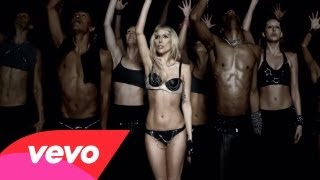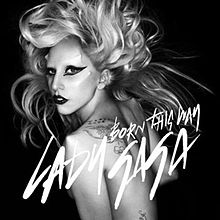| You are not logged in. | login to customize your own personal play list |
“Born This Way” by Lady Gaga |
| United States Federal Trade Commission forbids anyone under 13 from viewing these music videos! |
| You are not logged in. | login to customize your own personal play list |
“Born This Way” by Lady Gaga |
| United States Federal Trade Commission forbids anyone under 13 from viewing these music videos! |
 |
 |
 |
 |
You need Flash player 8+ and JavaScript enabled to view this video.
|
 |
 |
   |
 |

song info
 “Born This Way” by Lady Gaga (extended official video) is a pop song. Song Title: Born This Way (official video)Artist: Lady Gaga Album: Born This Way Genre: pop, dance, dance-pop, synthpop Composer: Copyright © 2010 Stefani Germanotta, Jeppe Laursen Musical key: B Major Lead Vocals: Lady Gaga Backing Vocals: Tamar Braxton Instruments: Fernando Garibay Keyboards: Fernando Garibay Programmer: Fernando Garibay, DJ White Shadow Producer: Lady Gaga, Fernando Garibay, Jeppe Laursen, DJ White Shadow Recorded: 2010, Abbey Road Studios, London, Germano Studios, New York, New York Released: 11 February 2011 Label: Streamline / Interscope / Kon Live This song won the 2011 MTV Video Music Wards for Best Video With A Message and Best Female Video. Number of listens: 33895Current rank: 130 (updated weekly) Highest rank: 90 (play the video all the way through to register a vote for this song) Translations courtesy of Apple and Google. |
||

Summary quotation from Wikipedia:
“Born This Way” is a song by American recording artist Lady Gaga, from her second studio album of the same name. Written by Gaga and Jeppe Laursen, who produced along with Fernando Garibay and DJ White Shadow, it was developed while Gaga was on the road with The Monster Ball Tour. Inspired by the 1990s empowering music for women and the gay community, Gaga explained that “Born This Way” was her freedom song. She sang part of the chorus at the 2010 MTV Video Music Awards in 2010 and announced the song as the lead single from the album. The single was released on February 11, 2011.
The song is backed by rumbling synth sounds, a humming bass and additional chorus percussion, with sole organ toward the end. The lyrics discuss the self-empowerment of minorities including the LGBT community as well as racial minorities, referring to “cholas” and “orients”, which drew criticism from Latino and Asian communities. Critics positively reviewed the song, calling it a “club-ready anthem”, though it faced criticism for having similarities with Madonna’s 1989 single “Express Yourself”. The song reached number one in over 25 countries and was her third single to top the US Billboard Hot 100 chart and the 1,000th song in that chart’s history (since 1958) to reach number one. “Born This Way” has sold 8.2 million copies worldwide, becoming one of the best-selling singles of all time.
Nick Knight directed the accompanying music video, which was inspired by painters like Salvador Dalí and Francis Bacon and their surrealistic images. Gaga is depicted as giving birth to a new race during a prologue. A series of dance sequences later, the video concludes with the view of a city populated by this race. Critics noted cultural references to the work of Madonna, Michael Jackson, Björk, late fashion designer Alexander McQueen, as well as to Greek mythology and surrealism.
Gaga performed the song at the 53rd Grammy Awards after coming out of an incubating vessel. It was also performed during the last leg of The Monster Ball Tour and in television shows such as Saturday Night Live, Dick Clark’s New Year’s Rockin’ Eve, and Good Morning America. The song was treated with different remixes, including a Country Road version recorded by Gaga herself and another by Indian production duo Salim and Sulaiman Merchant. Alice Cooper, Madonna, Katy Perry, Maria Aragon, and the cast of the TV series Glee have covered the song.
Background“The nexus of ‘Born This Way’ and the soul of the record reside in this idea that you were not necessarily born in one moment. You have your entire life to birth yourself into becoming the ultimate potential vision that you see for you. Who you are when you come out of your mother’s womb is not necessarily who you will become. ‘Born This Way’ says your birth is not finite, your birth is infinite.”In 2010, Lady Gaga was touring for her second world tour, The Monster Ball. At that time she started developing ideas for her second studio album, Born This Way. The first song written and recorded for the album was the title track itself which she wrote in Liverpool and Manchester, England, described by Gaga as a “magical message” song. She wrote it in ten minutes and compared the process to an Immaculate Conception. White Shadow, one of the producers of the track, credited Gaga for coming up with the idea and the theme behind the song. “We recorded it around the world, on the road, in whatever was available. It sounds like it reads, but not like you think until you hear it,” he added. Gaga wanted to record her own freedom song, and explained with Billboard her inspiration behind the song:
—Gaga talking about the meaning of “Born This Way”.“I want to write my this-is-who-the-fuck-I-am anthem, but I don’t want it to be hidden in poetic wizardry and metaphors. I want it to be an attack, an assault on the issue because I think, especially in today’s music, everything gets kind of washy sometimes and the message gets hidden in the lyrical play. Harkening back to the early ’90s, when Madonna, En Vogue, Whitney Houston and TLC were making very empowering music for women and the gay community and all kind of disenfranchised communities, the lyrics and the melodies were very poignant and very gospel and very spiritual and I said, ‘That’s the kind of record I need to make. That’s the record that’s going to shake up the industry.’ It’s not about the track. It’s not about the production. It’s about the song. Anyone could sing ‘Born This Way’. It could’ve been anyone.”On the 43rd episode of her web video series, Transmission Gagavision, Gaga told the interviewer that the greatest challenge she faced while writing “Born This Way” was how she could leave her insecurities behind her, and become confident. “‘Born This Way’ is who I am. An artist in a constant state of half-fantasy/half-reality at all times,” she added.
Artwork and release
On February 8, 2011, Gaga tweeted the words “Trois Jours” (“Three Days”), along with a picture of the official single artwork, via TwitPic. Gaga is shown topless in the black-and-white cover art and displays the tattoos on her back. Her hair is air-blown and she wears heavy make-up while sharp edges protrude from her face and shoulders. The artwork was described by Charlie Amter from The Hollywood Reporter as harkening back to the classic record covers from the 1980s. He compared it to the artworks by bands like Missing Persons, Roxy Music and Duran Duran. Gordon Smart from The Sun also felt that the “stark black and white image” had a glossy eighties air about it. Tanner Stransky from Entertainment Weekly gave a positive review of the cover art, feeling that Gaga looked almost “animalistic” in the picture, and her flowing hair made her look like a creature from the African jungle. She also added that the artwork was “totally and completely fierce”. Archana Ram from the same publication found similarities between the “Born This Way” cover art and Kylie Minogue’s cover art for her 2007 single “2 Hearts“. Nicole Eggenberger from OK! described the artwork as a perfect balance between the singer’s “wild side” and her glamorous looks. Leah Collins from Dose believed that the extreme make-up and tattoos were an ironic play on the title of the song.
Gaga had sung a few lines from the song while accepting the 2010 MTV Video Music Award for Video of the Year, for “Bad Romance”. Given as a Christmas gift to her fans, Gaga announced, via Twitter, the release dates of the album and the lead single at the stroke of midnight on New Year’s Day, 2011. The single was dated to be released on February 13, 2011, while the album on May 23, 2011. Supplementing this announcement came a black-and-white photograph in which Gaga, according to Jocelyn Vena from MTV, is “nude from the waist down, with her hair blowing about, and sporting a jacket with ‘Born This Way’ emblazoned in what looks like bedazzled jewels.” In late January 2011, Gaga released the lyrics of the song, before announcing that she planned to release the single two days prior to its stipulated date. Hence the song was premiered on radio stations worldwide at 6 a.m. EST on February 11, 2011, and was released for digital download from online retailers at 9 a.m. EST the same day.
Composition
“Born This Way” was written by Gaga and Jeppe Laursen (formerly of the band Junior Senior), and produced with Paul Blair (a.k.a. DJ White Shadow) and Fernando Garibay, while it was mixed at Abbey Road Studios in London and Germano Studios in New York. The club-beat influenced song begins with Gaga’s voice uttering the line “It doesn’t matter if you love him or capital H-I-M” on a loop, backed by a rumbling synth sound and a humming bass. As the synths change into a beat, Gaga belts out the song’s first verse, followed by the bass dropping off and the percussion-backed chorus, “I’m beautiful in my way, ’cause God makes no mistakes; I’m on the right track, baby, I was born this way”, which Jocelyn Vena from MTV likened as being “meant to be heard in a big space. It’s fast and hard-hitting.” After the chorus she chants the line “Don’t be a drag, Just be a queen” a number of times on top of handclaps, before moving to the second verse. After the second chorus an interlude follows, where Gaga chants the names of various communities. Sal Cinquemani from Slant Magazine felt that the interlude is a mixture of the music from American television show, Glee, and the song “There But For the Grace of God Go I” by Machine. The music fades out for a moment as Gaga sings a capella, before the addition of an organ and Gaga closes the song. According to the sheet music published at Musicnotes.com by Sony/ATV Music Publishing, “Born This Way” is written in the time signature of common time, with a moderate dance beat tempo of 124 beats per minute. It is composed in the key of B major as Gaga’s voice spans the tonal nodes of F♯ 3 C♯ 5. “Born This Way” follows a chord progression of F♯ 5-F♯ -E-B-F♯ in the chorus.
The lyrics during the verses talk about empowerment, while the chorus talks about making no apologies and accepting one as themselves. It features the names of LGBT and other minority communities, which was due to the support Gaga had received from the community over the years. She also explained that since The Fame and The Fame Monster did not directly address those communities, “Born This Way” was her chance to create something that not only supported her political and social beliefs, but also empowered her to artistically say, “‘I’m not being safe with this record.’ I’m not trying to gain new fans. I love the fans I already have, and this is for them.”
After the early release of the lyrics, it had garnered criticism from some Asian and Hispanic communities, including Latino groups MECha and Chicanos Unidos Arizona, claiming that the usage of the terms “chola” and “orient” was offensive and derogatory. In response to the lyrics, Robert Paul Reyes of Newsblaze.com stated that while he agreed with its pro-gay stance, he questioned the use of the term “chola”, asking, “Are Latinos supposed to be grateful that a white superstar, born of privilege, included a racist shout out to our community? Not all Latino ladies are ‘cholas’ in the barrio, some of them are teachers, writers, engineers and nurses and doctors.” Radio stations in Malaysia chose to garble the part of the lyrics dealing with the acceptance of the LGBT community, due to censorship in the country, on content that may be deemed offensive. In response, Gaga urged her Malaysian fans, who wanted the uncensored version to be played, to take action by stating: “It is your job and it is your duty as young people to have your voices heard. You must do everything that you can if you want to be liberated by your society. You must call, you must not stop, you must protest peaceably.”
Remixes
A number of remixes were commissioned by Interscope Records, to accompany the song. The first set of remixes were done by LA Riots, Chew Fu and DJ White Shadow. Titled Born This Way — The Remixes Part 1, the remixes were released as CD single and digital download on March 15, 2011. Another set of remixes were done by Michael Woods, Grum, Dada Life, Zedd, Bimbo Jones and Twin Shadow. It was released on March 29, 2011, for digital download only, with the name Born This Way — The Remixes Part 2. Gaga released a “Country Road Version” of the song on March 15, 2011, via her Twitter account. The version opens with the sound of guitars and then introduces a fuzzed-out slide guitar and harmonica wheeze, with the original disco beats replaced by restrained brush drumming and a more laid-back vibe. Once the first chorus starts, the song chugs alongside the harmonica sounds. Just before the three-minute mark, Gaga sings new lyrics, “If I wanna make it country, baby, then it’s OK, cuz I was born, I was born, I was born this way,” over a picked mandolin. According to Gil Kaufman of MTV, the song breaks into full-on country-rock mode, reminiscent of late-period Bon Jovi music, in the final minute. A portion of the money earned from sales of “Country Road Version” went to the Gay, Lesbian and Straight Education Network (GLSEN).
A Bollywood version of the song was done by Indian music producer duo Salim and Sulaiman Merchant. The remix was released on DesiHits.com, a website for South Asian music and entertainment news. The Merchants were discussing music projects with Anjula Acharia-Bath of DesiHits.com, when they came to learn that Gaga, who did not have much reach within the Indian diaspora, was interested in a Bollywood remix for “Born This Way”. The Merchants were contacted by Gaga’s manager, Troy Carter, and the remix was finalized. Sulaiman explained that they received Gaga’s raw vocals from “Born This Way”, and using it as a base, they designed the remix. “We sent her a rough cut of our composition for initial feedback on whether we were giving it the right groove. She loved it and that’s how we went about it,” he added. The Merchants used a number of Indian musical instruments like the dugi, sitar by Sunil Das, and the dhol and dholak in the chorus. Sulaiman told MTV News’ Jocelyn Vena:“It’s been such a big track, it’s been very popular, and when you consider the style, it’s very aggressive. It’s got all the stuff that’s required to make it a nice clubby track, so for us, the most important thing was: How do you get it into a zone where it’s palpable to the Indian flavor? And the first thing we did was bring in a sitar, and that changed the flavor a little bit. We kept the aggression but changed the style and made it a little more four on the floor, a little more house.”Salim said that he sang a little bit of alaap to give the remix a Sufi touch, “as that’s the kind of music we do and it was also about adding our signature.” Gaga’s management team were satisfied with their remix and wanted them to do another remix of her next song, “Judas”. The Bollywood remixes were a part of the Indian tracklist of Born This Way.
Critical reception
“Born This Way” received generally positive reviews from music critics upon its release. Michael Cragg from The Guardian called the song a “disco anthem”, and said the chorus “crashes in with the weight of a discarded meat dress”. He also felt that the “campness” of the music made the lyrics sound less serious than it is. Rick Florino of Artistdirect gave the song five out of five stars and labeled it as “an immediate pop classic”, complimenting the hook and the chorus. Alison Schwartz from People added that “the club-ready anthem, complete with a few A Capella chants and Italian lyrics, shows off Gaga’s powerhouse vocal chords—and knack for powerful songwriting.” Jem Aswad from Billboard responded positively to the anthemic nature of the song, and felt that it would become a staple song to be played on the radio and dancefloors in the following months. Nick Levine of Digital Spy gave the song five out of five stars, describing it as a “life-affirming equality anthem, a straight-up club pumper and a flat-out fantastic pop song.” Writing for Slant Magazine, Sal Cinquemani understood that Gaga “has tapped into something truly special, maybe even important.” He also complimented the song’s underlying message of equality. Meghan Casserly of Forbes expected “Born This Way” to be the biggest gay anthem ever, since, according to her, it was written with that purpose in mind. Annie Yuan of The Hollywood Reporter labeled the song “a hodge-podge of other pop tunes.” Kevin O’Donnell of Spin gave a mixed review, pointing out lyrical similarities to Michael Jackson’s “Black or White” (1991). He added that seeing the hype surrounding the project, he expected Gaga to release a song “as epic and instantly classic as The Beatles’ ‘A Day in the Life’ or Queen’s ‘Bohemian Rhapsody’. Imagine what she’d come up with if she’d spent more than ten minutes writing [the song].”
Many critics noted similarities between “Born This Way” and Madonna’s 1989 song, “Express Yourself”. Popjustice website pointed out the influence of other Madonna songs like “Deeper and Deeper” (1992) and “Vogue” (1990). Rob Sheffield of Rolling Stone acknowledged the influences of Madonna but pointed out that they would not overshadow the song, as it “[summed] up all the complex Gaga mythos, all her politics and Catholic angst and smeared lipstick, in one brilliant pop blast.” Caryn Ganz, while writing for Yahoo! Music, criticized “Born This Way”, stating that the song was “overworked, overwrought, noisy, cheesy, and very, very derivative.” She specifically noted the similarities to songs like “When Love Takes Over” (2010), “Waterfalls” (1995), and three of Madonna’s songs: “Express Yourself”, “Ray of Light” (1998), and “Vogue”. Megan Friedman from Time and Marissa Moss from The Huffington Post summarized their reaction as “mixed”, due to the similarities they found with “Express Yourself”. Neil McCormick of The Daily Telegraph noted that the imitative nature of the song would affect perceptions of Gaga’s artistry, since “Born This Way” was “[basically] a reworking of Madonna’s ‘Express Yourself’ with a touch of ‘Vogue’, which is a bit too much Madonna for someone who is trying to establish her own identity as the, er, new Madonna.”
Ann Powers of the Los Angeles Times concluded that “Born This Way” had an entirely different message from the Madonna songs it was being compared to and further defended it by saying, “Whether its sound comes too close to one or another Madonna song seems beside the point; what current pop hit doesn’t go green by recycling something familiar?”. Gaga herself addressed the comparisons on The Tonight Show with Jay Leno, explaining that she had received an e-mail from Madonna’s representatives, who had mentioned their support for “Born This Way”. “If the Queen says it shall be, then it shall be,” she added. CNN later reported that Madonna’s representatives were not aware that the singer, or her team, had sent Gaga an e-mail regarding the situation. Two months later, while getting interviewed by NME magazine, Gaga further addressed the comparisons to “Express Yourself”:“Why would I try to put out a song and think I’m getting one over everybody? That’s retarded. I will look in your eyes and tell you that I’m not dumb enough or moronic enough to think that you are dumb or moronic enough not to see that I would have stolen a melody. If you put the songs next to each other, side by side, the only similarities are the chord progression. It’s the same one that has been in disco music for the last 50 years. Just because I’m the first fucking artist in 25 years to think of putting it on Top 40 radio, it doesn’t mean I’m a plagiarist, it means I’m fucking smart. Sorry.”When interviewed by ABC News in 2012, Madonna was asked about the similarities between “Born This Way” and “Express Yourself”, stating: “When I heard [‘Born This Way’] on the radio … I said, ‘that sounds very familiar’ … It felt reductive.” She also came to report to The Newsweek Daily Beast Company what she had in mind when she heard “Born This Way”: “I thought, ‘What a wonderful way to redo my song’. I mean, I recognised the chord changes. I thought it was… interesting.”
Recognition
At the end of 2011, Slant Magazine listed “Born This Way” as the fifth best song of the year, with Ed Gonzalez from the website commenting that the song is an “unmistakable landmark pop-cultural moment, a post-irony, post-metaphor, pansexual celebration, aimed squarely at the audience that probably needs it the most.” It also placed the same rank on the list by MTV, with Gil Kaufman from the channel saying that the song and the music video “added to Gaga’s mind-tripping visual canon and further established her as one of the biggest triple threats in music.” PopMatters listed it at position 73 on their list of “The 75 Best Songs of 2011”, with Sean McCarthy from the website saying that although Born This Way “is a labor to listen to because of its over-the-topness. No such problems exist with the title track. All of the Gaga’s strengths on her one-hour monolith are condensed into a four-minute unstoppable ode to the outcasts of the world.” Furthermore, The Guardian listed “Born This Way” as the 18th best song of 2011.
Chart performance“I can’t believe it. I’m humbled, honored and overwhelmed at the reception to ‘Born This Way’. This has been so life-changing for me. Between Billboard and the international No. 1s, and the radio numbers… I couldn’t be more blessed to have the fans I have. I knew when I wrote the song it was special, but I also knew that perhaps my fans or my label were hoping for me to deliver ‘Bad Romance the Third’ or ‘Poker Face the Third’. I wanted to do exactly the opposite.”In the United States, “Born This Way” debuted at number one on the Billboard Hot 100 chart, for the issue dated February 26, 2011, as well as becoming Gaga’s third number one single. “Born This Way” became the nineteenth song to debut at number one on the Hot 100, and the 1000th number one single in the chart’s history. The song sold 448,000 digital downloads in three days, the most downloads in a first week by a female artist, beating the previous record held by Britney Spears’ “Hold It Against Me”. The record would be later broke by Taylor Swift’s “We Are Never Ever Getting Back Together” when it sold 623,000 digital copies in its debut week in the week ending September 1, 2012. “Born This Way” remained at the top the following week, selling another 509,000 copies in its first full week of release, and becoming the first song to enter the Hot 100 at number one and hold that position for a second week since Clay Aiken’s “This Is The Night” in 2003. Subsequently, the song held the number one spot for six weeks making it the only song to debut at number one and stay there for over a month since Elton John’s “Candle in the Wind 1997” in 1997. “Born This Way” went onto break the record for the fastest selling song in iTunes history, selling a million copies worldwide in five days. The song’s CD single sold 24,000 copies in its first week of release and a total of 40,000 copies till March 2011. “Born This Way” sold 3.47 million digital copies in 2011 and became the tenth-best-selling song of the year in the United States. It is her eighth consecutive song to top the two million mark, and her sixth song to reach three million downloads. As of May 2014, it has sold four million digital downloads in the US.
—Gaga talking to Billboard about the commercial reception of “Born This Way”.
“Born This Way” debuted at number 14 on the Billboard Pop Songs chart with 4,602 plays after three days of availability, the highest detections total by a debuting song in the chart’s history. It was the second-highest debut on that chart, behind Mariah Carey’s “Dreamlover” (1993) which debuted at number 12. In its seventh week on the chart, “Born This Way” reached the top, becoming Gaga’s seventh number-one song there, thus tying her with Pink and Rihanna as the artist’s with the most number one songs on the chart. In addition, the song broke the overall airplay debut record with a first week audience of 78.5 million, entering at number six on the Radio Songs chart; this feat surpassed Janet Jackson’s “All for You” (2001) which had debuted at number nine with an audience of 70 million. “Born This Way” topped the chart after seven weeks, becoming her second number-one radio song after “Paparazzi”. “Born This Way” topped the Japan Hot 100 and Hot Dance Club Songs charts, reached top-ten on Latin Pop Airplay and Adult Contemporary, and number 11 on Adult Top 40 charts. “Born This Way” took the number one position in its debut week in Canada, remaining atop the Canadian Hot 100 for seven weeks.
On February 20, 2011, the single debuted at number one in Australia on the official ARIA Singles Chart, becoming Gaga’s third number-one single there, and the highest selling song to debut at the top. “Born This Way” was certified four-times platinum by the Australian Recording Industry Association (ARIA) for shipment of 280,000 copies of the single. The single debuted at number one on the New Zealand RIANZ charts, becoming Gaga’s second number-one single there after “Poker Face” (2008). It was certified platinum by the Recording Industry Association of New Zealand (RIANZ) for shipment of 15,000 copies of the single. In the United Kingdom, “Born This Way” logged first week sales of 60,000 digital copies, landing it at number three on the UK Singles Chart, which became its peak position. It has sold 625,000 copies in 2011 in the UK. Elsewhere, the song debuted atop the charts in Spain, Finland, Ireland, and the Netherlands. “Born This Way” debuted at number two in Italy, France, Sweden, Norway, Austria, Germany, and Belgium (Flanders). In addition, it debuted at number-four in Denmark and then moved to the second spot. It also entered the top ten of the charts in Czech Republic and Hungary and reached the top of the charts in South Korea. “Born This Way” had sold 8.2 million digital copies by November 2011 and had become the fifth best-selling digital single of the year, worldwide.
Music video
Development
The music video was shot the weekend of January 22-24, 2011 in New York City, and was described by Gaga’s team as a “profound, so inspiring and so incredibly beautiful” video. The video was directed by Nick Knight. Choreographer Laurieann Gibson told MTV News that the video would be “shocking” and one can expect the execution of the highest level of vocal music art and dance. Hollywoodlife.com reported that Gaga spent the first week of February editing the video at the Greenwich Hotel, New York, working during the night as she had to spend the morning rehearsing for her upcoming Grammy Awards performance. Media reports suggested that the singer might play the character of Jo Calderone, the male model she had portrayed in the September issue of Japanese Vogue Hommes. Fernando Garibay explained that the video “is of cultural relevance, and hopefully helps people that are an outcast, bullied. Hopefully makes people aware that it’s OK to be yourself.” According to Gaga, she was inspired by the paintings of Salvador Dalí and Francis Bacon, and their surrealistic images. Gibson explained the inspiration behind the video to MTV News:“When she played it for me, it took me a while to find out the visual interpretation that I could give back to her. And so I woke up one night and I got it, and I said, ‘I got it: We have to birth a new race.’ From the gate, Gaga was like, ‘I want Nick Knight for this video. I want a visual.’ She was always birthing something visual in her head, and Nick Knight is just, well, he’s prolific but he’s so genius. It was about pushing the bar of what a music video should be and can be. […] It’s a different time; it’s a different era; there are no limits. It is a viral message. I think that there’s something in there for everyone, and that’s what’s so amazing about the video and so specific about the message.”Gibson recalled having to work with Gaga on her dancing in the video, and to make her a better dancer she wanted Gaga to be confident. Gaga chose New York to shoot the video because the city is her birthplace. Before shooting started, Gibson and Gaga decided there was only one place to work on the avant-garde, modern dance routine for the video, Alvin Alley, where Gibson had studied dance. “We rehearsed there because the choreography is really modern-based. It’s, like, more technical than anything she’s ever done,” she recalled. Shooting also took place in Brooklyn for two days. Since Gaga did not want set pictures to be taken before the video was ready, her team had to hide the location and were successful, except at the last day when paparazzi started sneaking around.
The video featured full-bodied tattooed model Rick Genest (Rico), better known by his stage name Zombie Boy. Gaga painted her face in a similar way to Genest, in one of the main series of sequences. She said that the sequences displayed the fact that she would not allow society or critics to dictate her sense of beauty. “I tell you what I think is beauty, and hence the scene was of me and Rico defining ourselves in artistic way and not relying on society to dictate it,” she added. The costumes for the video were designed by Formichetti, who blogged about the various designer pieces shown in it. In the opening sequence of the video, Gaga wore a head accessory by Alexis Bittar, a diamond neckpiece by Erickson Beamon with earrings by Pamela Love, and a stained-glass dress by Petra Storrs. Finger rings were provided by Erickson Beamon and chiffon clothes by Thierry Mugler. For the skeletons sequences, both she and Rico wore tuxedos by Mugler while the slime during the orgy scenes were courtesy of Bart Hess. For her Michael Jackson impression in the alley at the video’s end, Gaga wore shirt and pants by Haus of Gaga, shoes by Natacha Marro, a Billykirk belt and LaCrasia gloves.
Synopsis
Released on Monday, February 28, 2011, the video begins with a brief shot of a unicorn’s silhouette in a steam-filled alley, inside a pink triangle frame. The triangle transitions to a shot of Gaga, with two opposite facing heads, inspired by Janus, the Roman god of transition and beginnings, sitting in an ornate glass throne amidst a star-filled space. As Bernard Herrmann’s prelude to the movie Vertigo plays, Gaga tells the story of the creation of an extraterrestrial race that “bears no prejudice, no judgment, but boundless freedom.” Gaga sits in the throne, giving birth to a “new race within the race of humanity.” She explains that this was followed by the birth of evil, due to which Gaga splits into two opposing forces of good and evil. Her new half gives birth to a machine gun and fires it. The prologue concludes with Gaga questioning, “How can I protect something so perfect, without evil?”
Gaga, with shoulder and facial protrusions (prosthetic makeup mimicking subdermal implants) walks in a seemingly endless black space, where people are on their hands and knees in an organized pattern. She raises her hand and crouches down to join them. When the first verse begins, everyone dances to choreography. The scenes alternate between the dance, and Gaga singing on her throne in space. In the second verse, Gaga and Rico are in tuxedos, with her face painted to mirror his. Alternating clips show Gaga caressing and attempting to dance with him while he stays expressionless and motionless for the most part. When the chorus plays for the second time, Gaga sings in a room of mirrors, with her head displayed in a glass box among oddly distorted mannequin heads. In the succeeding shots, she is once again shown on her throne giving birth to more members of the new race. After choreographed routines by Gaga and her dancers, they all gather in a circle and embrace in a hug.
In the video’s conclusion, Gaga’s silhouette struts in an alley in a tribute to Jackson’s “The Way You Make Me Feel” video. Her face is misconstrued, with sharp horns protruding from her face, glowing eyes, uneven hair, and a distinct Madonna-esque gap between her front teeth. Gaga has commented that she was teased as kids would call her “rabbit teeth”. She sheds a single tear as the pink triangle frame appears again, and inside it, a silhouette of Gaga sitting atop the unicorn. A city and a rainbow appear in the background, and Gaga is seen in her zombie makeup, chewing bubble gum and blowing it, as the pink triangle zooms away.
Reception
The music video for “Born This Way” was met with generally positive reception among music critics. James Montgomery of MTV praised the overall creationism concept of the music video, adding that it “sort of makes sense, it sort of doesn’t, but that 100 percent doesn’t really matter much. This is Gaga at her most fabulous, her most out-there, her most, well, Gaga.” In conclusion of his review, he wrote that the fantasy aspects of the video is overshadowed by the overall spectacle, which he believed was analogous to Gaga, “after thoroughly dominating this world with ‘Born This Way,’ [she] seems content to create brand-new worlds to tower over.” Myrddin Gwynedd of The New Zealand Herald felt that Gaga’s penchant for eccentric and provocative imagery, was extreme in the video. Raphael Chestang from Entertainment Tonight praised the performance of Gaga and her dancers in the video, also complimenting the fashion. Monica Herrera from Billboard noticed that the video bore similarities to the music video of Madonna’s “Vogue” and “Borderline” (1984), while believing it to be “more of a high-fashion short film than a conventional music video”. Jim Farber from New York Daily News wanted Gaga to add more humor in her videos, adding that although the video had “joyous” shock value, it definitely lacked creativity.
Oscar Moralde from Slant Magazine noted that in the video, “Gaga fully embraces the monstrous as a part of her.” Moralde further explained that previously the singer had acknowledged her role as “Mother Monster”, but never to the visceral, fully embodied extent that she does in the video. “The things that are monstrous, the things that are different—for Gaga, those are the things that are beautiful,” he concluded. Gina Serpe from E! Online criticized it for being a “Madonna rip-off”, while Matthew Perpetua of Rolling Stone noted similarities to some of Madonna’s work and the imagery from in the 1927 German expressionist film, Metropolis. Ann Powers from the Los Angeles Times noted that the video paid tribute to the Goddess movement and feminism. According to her, with the video Gaga made goddess culture accessible to the mass, by portraying images borrowed from fine art, cinema and cool subcultures. Examples given by her included the portrayal of Rico as her partner, instead of a conventional-looking male or female consort. Powers further added that “Gaga has found a way to place female empowerment at the center of her vision without sacrificing the gains she makes by being a daddy’s girl or a ‘boy toy’.” Megan Powers from Time criticized the video and Gaga’s usage of shock-imagery, which she still found “strange”. The video has been noted for its cultural references and artistic similarities, not only to other recording artists such as Jackson and Madonna, but to Greek and Roman mythology, surrealism and the work of Swiss painter H. R. Giger and late fashion designer Alexander McQueen.
The video won two awards at the 2011 MTV Video Music Awards, in the categories of Best Female Video and Best Video With a Message. Along with the song winning the 2011 MTV Europe Music Award for Best Song, Gaga won also the award for Best Video with “Born This Way” at the same event.
—from Wikipedia (the Wikipedia:Text of Creative Commons Attribution-ShareAlike 3.0 Unported License applies to Wikipedia’s block of text and possible accompanying picture, along with any alterations, transformations, and/or building upon Wikipedia’s original text that ThisSideofSanity.com applied to this block of text)
The Americans with Disabilities Act (ADA) and U.S. Government Section 508 of the Rehabilitation Act of 1973 require that web sites provide transcripts of audio for the deaf.
We will be adding lyrics to all songs as fast as we can. Please be patient.
Molly: Born This Way is Claire’s favorite song.
To submit a comment, use the form below:
Please use the form (with the delay for a human to inspect it) because this website is attacked by more than 20 spam attempts per minute. The only way to keep you safe from the spam is by having human review.
 |
  |
|
If you spot an error in fact, grammar, syntax, or spelling, or a broken link, or have additional information, commentary, or constructive criticism, please contact us.
Copyright © 2014 Milo. All rights reserved. Todos Derechos Reservados. The copyrights on all source code and the data base belong to Milo and are used on this web site by permission.
The source code is at OSdata.com, released under Apache License 2.0.
Copyright 2012, 2013, 2014 Milo
Licensed under the Apache License, Version 2.0 (the “License”); you may not use this file except in compliance with the License. You may obtain a copy of the License at:
http://www.apache.org/licenses/LICENSE-2.0
Unless required by applicable law or agreed to in writing, software distributed under the License is distributed on an “AS IS” BASIS, WITHOUT WARRANTIES OR CONDITIONS OF ANY KIND, either express or implied. See the License for the specific language governing permissions and limitations under the License.
Enjoy the This Side of Sanity website Twitter feed.
Enjoy the This Side of Sanity Twitter feed.

|
player artwork by michaelm